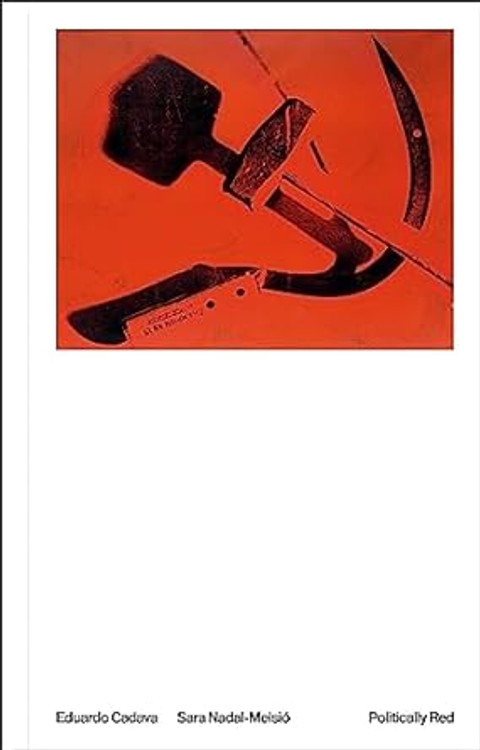- Publisher : The MIT Press (December 5, 2023)
- Language : English
- Paperback : 400 pages
- ISBN-10 : 0262047802
- ISBN-13 : 978-0262047807
How reading and writing are collective acts of political pedagogy, and why the struggle for change must begin at the level of the sentence.
“Reading is class struggle,” writes Bertolt Brecht. Politically Red contextualizes contemporary demands for social and racial justice by exploring the shifting relations between politics and literacy. Through a series of creative readings of Karl Marx, Rosa Luxemburg, Walter Benjamin, W. E. B. Du Bois, Fredric Jameson, and others, it casts light on history as an accumulation of violence and, in doing so, suggests that it can become a crucial resource for confronting the present insurgence of inequality, racism, and fascism. Reading between the lines, as it were, and even behind them, Cadava and Nadal-Melsió engage in an inventive mode of activist writing to argue that reading and writing are never solitary tasks, but always collaborative and collective, and able to revitalize our shared political imagination. Drawing on what they call a “red common-wealth”—an archive of vast resources for doing political work and, in particular, anti-racist work—they demonstrate that sentences, as dynamic repositories of social relations, are historical and political events.
Review
“More than simply original, Politically Red creates its own new genre of theoretical intervention into the ongoing struggle. The magic of the book is that its potential audience gets wider and wider. Encountering its materialist practice of engaged reading, the reader gets caught in the danger we are in and experiences the urgent need to act together.”
—Slavoj Žižek, International Director, Birkbeck Institute for the Humanities, University of London
“We must remain enthralled by the general strike's unflashy immersion of perception. Mythic agential exertions of the subjects of history fade when the caught, all caught up in fight and flight, evade and surround the observations of political science like a spring gone underground unto irruptive flood. In such recession, recursion, and rehearsal, preparation and enactment blur. We keep asking, how did that happen, as we wonder how it might happen, while we see it happening, all unseen and all the time. With inventive, devoted erudition, Eduardo Cadava and Sara Nadal-Melsió show how Du Bois, Luxemburg, and Benjamin set the scene of our observance and our chance. Politically Red is a new, beautiful, revolutionary curriculum.”
—Fred Moten, Professor of Performance Studies and Comparative Literature, New York University
“Politically Red is an elegant practicum in the art of reading. Soaring beyond the bounds of genre, it moves from Friedrich Engel's doodled visualizations, encroaching upon the pages of Karl Marx's scribblings about Young Hegelianism, to an excavation of Walter Benjamin's reading of Marx. It hovers over the allegorical meaning of Rosa Luxemburg's empty grave before moving to W. E. B. DuBois's data portraits of inequality in the American south. It sets Paul Scheerbart's asteroid novel alongside Auguste Blanqui's political cosmologies and Marx's notes on indigenous communal forms. It is a brilliant exemplar of what Benjamin himself once described as his methodological project: a 'highly theorized constellation of fragments.' A beautiful meditation upon the power and community of sustained thought—of conversations contained within conversations—it braids contemporary politics to multiple materialist histories, revealing the complex and often invisible echophenomena of violence, mourning, and refusals of erasure.”
—Patricia J. Williams, University Distinguished Professor of Law and Humanities, Northeastern University
“Politically Red discloses the image of a thinker, Walter Benjamin, that is strikingly different from the one that has become a familiar feature in both contemporary scholarship and popular culture, for this Benjamin is 'red' from beginning to end. By patiently uncovering the connections between Benjamin and a variety of political thinkers who are rarely brought into close contact with his work—especially Rosa Luxemburg and W. E. B. Du Bois—Cadava and Nadal-Melsió not only show that the gravitational center of this work lies in a 'red common-wealth,' which resists the accumulation of capital; they also show through their practice of reading how such a common-wealth is configured.”
—Peter Fenves, Joan and Sarepta Harrison Professor of Literature, Northwestern University
“’Politics,’ Walter Benjamin once wrote, involves 'the art of thinking in other peoples' heads.' Although Eduardo Cadava and Sara Nadal-Melsió are aware of the potential violence in this formula, their inspired readings of key thinkers in the Marxist tradition demonstrate the real liberation that can result from an engaged ‘play on words.’ Politically Red reconnects and recharges the often-broken circuit between theory and praxis.”
—Hal Foster, Townsend Martin, Class of 1917; Professor of Art and Archaeology, Princeton University
“Every now and then, a truly inspiring book comes along to remind us, in unexpected ways, of what learning to read and think in a political manner might entail. Politically Red derives its political and conceptual poignancy from the imaginative interweaving of a textual model of reading with a genealogical one. The core of the book, its beating heart, is the gripping discussion of Rosa Luxemburg and her present absence, or absent presence, or presence through absence, in Walter Benjamin. As long as such transformative scholarship continues to emerge from our universities, we still have reason to hope.”
—Gerhard Richter, L. Herbert Ballou University Professor of German Studies and Comparative Literature, Brown University
“What does it mean to write theory or philosophy? How do we read (red) a political text? Avoiding the impasse of thinking language as an instrument to represent philosophical or political ideas, Eduardo Cadava and Sara Nadal-Melsió embark on a fascinating exploration about the invention of new languages (not just lexica but also archival traces of non-linguistic forms of figuration) in critical and political red thinkers from Marx and Engels to Fredric Jameson. Surpassing the traditional binary distinction between poetry and politics, between theory and practice, Cadava and Nadal-Melsió open a completely new field of literacy research that from now on nobody will be unaware of. A ground-breaking reading act athwart disciplines.”
—Paul Preciado, author of Dysphoria Mundi
About the Author
Eduardo Cadava is Philip Mayhew Professor of English at Princeton University. His books include Words of Light: Theses on the Photography of History, Emerson and the Climates of History, and Paper Graveyards.
Sara Nadal-Melsió is a New York City-based Catalan writer, curator, and teacher. Presently writer-in-residence at the Slought Foundation in Philadelphia, she has taught at the University of Pennsylvania, Princeton University, SOMA in Mexico City, and New York University. Her essays have appeared in various academic journals, edited volumes, and museum catalogs. She is the co-author of Alrededor de/ Around, and the editor of two special issues on cinema, The Invisible Tradition: Avant-Garde Catalan Cinema under Late Francoism and The Militant Image: Temporal Disturbances of the Political Imagination. She has recently cocurated a show on Allora & Calzadilla for the Fundació Tápies in Barcelona and has written a book essay about it, To Be All Ears, To Be in the World: Acoustic Relation in Allora & Calzadilla, as well as edited a companion volume on the Puerto Rican crisis, A Modest Proposal: Puerto Rico’s Crucible. Her book Europe and the Wolf: Political Variations on a Musical Concept is forthcoming from Zone Books.




